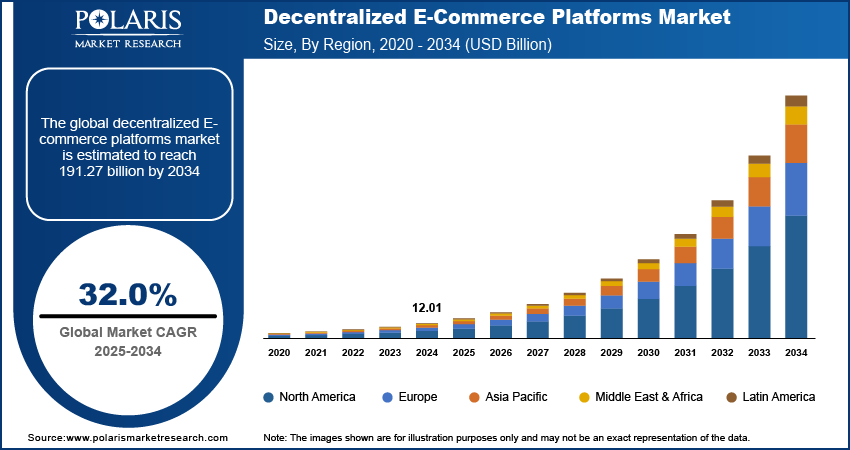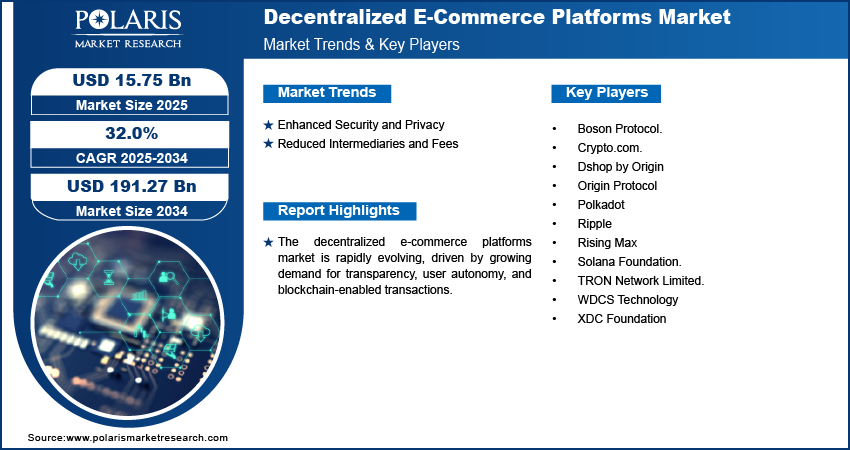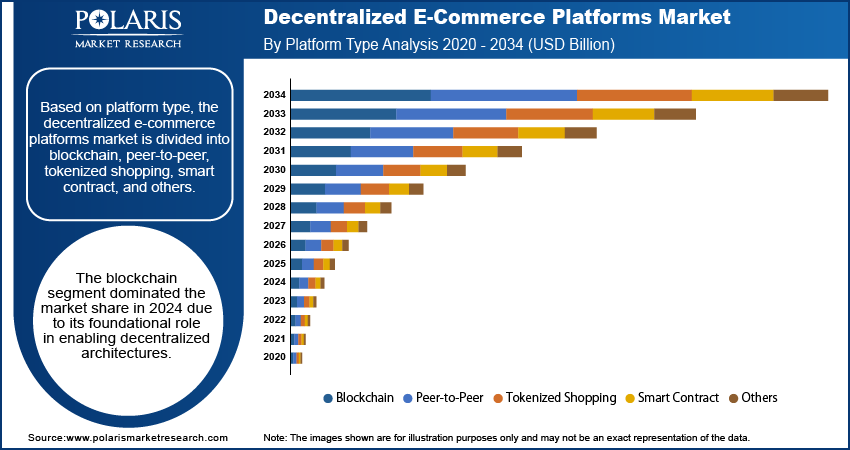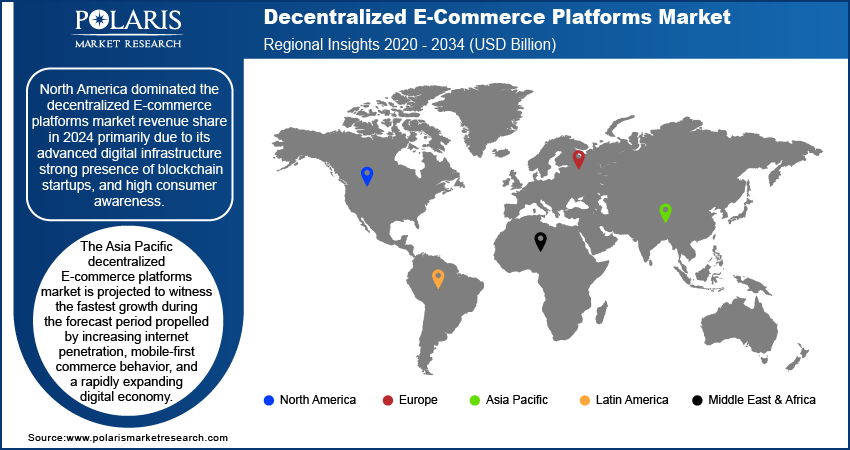
Decentralized E-Commerce Platforms Market Size, Share, Trends, Industry Analysis Report
: By Platform Type (Blockchain, Peer-to-Peer, Tokenized Shopping, Smart Contract, and Others), Technology, Product Category, End User, and Region (North America, Europe, Asia Pacific, Latin America, and Middle East & Africa) – Market Forecast, 2025–2034
- Published Date:Aug-2025
- Pages: 129
- Format: PDF
- Report ID: PM5580
- Base Year: 2024
- Historical Data: 2020-2023
Market Overview
The global decentralized e-commerce platforms market size was valued at USD 12.01 billion in 2024, at a CAGR of 32.0% during 2025–2034. Decentralized e-commerce platforms are gaining momentum due to rising demand for secure, low-cost, censorship-resistant, and globally accessible digital commerce solutions.
Key Insights
- Blockchain dominated the platform segment in 2024 due to its secure, transparent, and decentralized infrastructure that supports trustless transactions.
- Digital products/NFT are the fastest-growing category, fueled by demand for verifiable ownership and seamless tokenized asset transactions.
- North America led the market in 2024 due to strong digital infrastructure, Web3 investments, and supportive regulatory frameworks.
- Asia Pacific is the fastest-growing region, driven by rapid internet adoption, mobile commerce, and growing interest in blockchain-based solutions.
Industry Dynamics
- Rising demand for data privacy and ownership is encouraging users to adopt decentralized platforms for greater control and transaction transparency.
- Elimination of intermediaries through smart contracts lowers costs, boosts seller margins, and offers better pricing for end consumers.
- Growing dissatisfaction with centralized tech monopolies is pushing businesses and creators to explore alternative, self-sovereign digital marketplaces.
- Lack of user-friendly interfaces and onboarding complexity hinders mass adoption among non-technical users unfamiliar with blockchain technologies.
Market Statistics
2024 Market Size: USD 12.01 billion
2034 Projected Market Size: USD 191.27 billion
CAGR (2025–2034): 32.0%
North America: Largest market in 2024
AI Impact on Decentralized E-Commerce Platforms Market
- Personalized shopping experiences are enhanced on decentralized platforms through intelligent algorithms that operate without centralized data collection.
- The performance and accuracy of smart contracts are improved, minimizing manual errors and streamlining automation processes.
- Instant customer support is delivered across decentralized networks via chatbots, ensuring seamless interactions without centralized oversight.
- Supply chain efficiency is optimized through advanced forecasting, inventory planning, and real-time tracking across decentralized commerce systems.

To Understand More About this Research: Request a Free Sample Report
Decentralized e-commerce platforms refer to digital marketplaces that operate on blockchain or distributed ledger technologies, eliminating the need for intermediaries and central authorities. These platforms are redefining traditional e-commerce by providing a more transparent, secure, and user-empowered environment. Global accessibility and inclusion enable users from underserved or unbanked regions to participate in digital commerce. These platforms remove barriers such as geographical limitations, payment restrictions, and regulatory complexities by leveraging decentralized infrastructure, substantially boosting the decentralized e-commerce platforms market demand. This democratization of access boosts broader participation, allowing individuals and small businesses globally to engage in commerce without reliance on traditional financial systems or centralized platforms.
Resilience drives the growth of decentralized e-commerce against centralized failures, as traditional e-commerce platforms often depend on centralized servers and intermediaries, making them vulnerable to systemic failures, data breaches, or policy-driven disruptions. In contrast, decentralized platforms distribute control and data storage across a network of nodes, especially reducing single points of failure and enhancing platform stability, uptime, and trustworthiness among users.
This resilience is strengthened by the continuous advancement of blockchain infrastructure and collaborative partnerships within the ecosystem. For instance, in October 2022, Kyro Digital launched a full-stack Polygon development platform and partnered with Veritone to integrate its AI platform, aiWARE. The collaboration enables enterprises to build and deploy Web3 applications faster using Kyro's tools and Polygon's blockchain infrastructure. Therefore, as businesses and consumers become increasingly concerned about data privacy, censorship, and platform dependency, the decentralized model presents a robust alternative that ensures continuity and integrity in digital transactions.
Market Dynamics
Enhanced Security and Privacy
Enhanced security and privacy serve as a critical driver for the decentralized e-commerce platforms market growth by offering users greater control over their data and transactions. Unlike traditional platforms that store information on centralized servers, making them susceptible to breaches, decentralized systems use blockchain technology to ensure that all transactions are encrypted, immutable, and transparent. The growing emphasis on data protection is particularly urgent, as highlighted by a December 2024 CSIS report, which documented a 138% rise in cyberattacks on Indian government entities in 2023 alone, totaling 204,844 incidents. Such vulnerabilities in centralized systems highlight the need for decentralized alternatives that prioritize security by design. The structure minimizes the risks associated with data leaks, identity theft, and unauthorized access. Moreover, users retain ownership of their credentials and digital assets, reinforcing trust in the platform’s integrity.
Reduced Intermediaries and Fees
Reduced intermediaries and fees are accelerating the shift toward decentralized e-commerce. Conventional e-commerce ecosystems often involve multiple layers of intermediaries, such as payment processors, logistics partners, and platform operators, each taking a portion of the transaction value. Decentralized platforms streamline this structure by enabling direct peer-to-peer interactions through smart contracts, effectively eliminating many third-party dependencies. This reduction decreases operational costs and also increases value retention for sellers and offers more competitive pricing for buyers. The need for alternatives to traditional platforms has been highlighted by regulatory developments targeting large technology companies. In September 2023, the European Commission designated six gatekeepers for the first time: Alphabet, Amazon, Apple, ByteDance, Meta, and Microsoft. In total, 22 core platform services provided by these gatekeepers were designated. This regulatory scrutiny of dominant platforms highlights the decentralized e-commerce platforms market opportunity for decentralized alternatives that operate outside traditional power structures.

Segment Insights
Market Assessment by Platform Type Outlook
The global decentralized e-commerce platforms market segmentation, based on platform type, includes blockchain, peer-to-peer, tokenized shopping, smart contracts, and others. The blockchain segment dominated the decentralized E-commerce platforms market share in 2024 due to its foundational role in enabling decentralized architectures. Blockchain provides a transparent, immutable, and secure ledger system that facilitates trustless transactions, making it ideal for digital marketplaces. Its integration ensures data integrity, enhances transaction verification, and eliminates the need for centralized oversight. Blockchain has emerged as the preferred platform type for building scalable and reliable decentralized ecosystems as businesses and consumers increasingly value transparency, accountability, and autonomy in online commerce.
Market Evaluation by Product Category Outlook
The global decentralized e-commerce platforms market segmentation, based on product category, includes physical goods, digital products/NFT, service-based platforms, mixed-use platforms, and others. The digital products/NFT segment is expected to witness the fastest growth during the forecast period, driven by the increasing demand for verifiable ownership and digital asset monetization. NFTs and other tokenized digital goods benefit from blockchain's inherent traceability and authenticity, offering creators and buyers a unique and secure way to transact. This segment aligns naturally with decentralized commerce with minimal logistical complexities and growing interest in digital collectibles, art, and media.

Regional Analysis
By region, the report provides the decentralized e-commerce platforms market insights into North America, Europe, Asia Pacific, Latin America, and the Middle East & Africa. North America dominated the decentralized e-commerce platforms market revenue share in 2024 primarily due to its advanced digital infrastructure, strong presence of blockchain startups, and high consumer awareness. The region’s favorable regulatory environment, combined with a mature e-commerce ecosystem, has created an ideal foundation for the early adoption of decentralized technologies. Moreover, North American enterprises are actively investing in Web3 innovations, driving further integration of decentralized platforms. This leadership position reflects the region’s strategic advantage in technology readiness, investment capabilities, and consumer openness to emerging digital models.
The Asia Pacific decentralized e-commerce platforms market is projected to witness the fastest growth during the forecast period propelled by increasing internet penetration, mobile-first commerce behavior, and a rapidly expanding digital economy. According to the Ministry of Communications data published in August 2024, India recorded 954.40 million internet subscribers in March 2024, reflecting an essential foundation for Web3 adoption. Emerging markets within the region are adopting decentralized solutions to overcome infrastructural challenges and enable broader financial inclusion. The growing population of digital-native consumers, combined with government interest in blockchain adoption, supports the scalability of such platforms. Therefore, as digital ecosystems mature across countries such as India, China, and Southeast Asian nations, Asia Pacific is poised to become a critical growth engine for decentralized commerce.

Key Players & Competitive Analysis Report
The competitive landscape features global leaders and regional players competing for a decentralized e-commerce platforms market share through innovation, strategic alliances, and regional expansion. Global players utilize strong R&D capabilities, technological advancements, and extensive distribution networks to deliver advanced solutions, meeting the growing demand for disruptive technologies and sustainable value chains. Decentralized e-commerce platforms market trends highlight rising demand for emerging technologies, digitalization, and business transformation driven by economic growth, geopolitical shifts, and macroeconomic trends. Global players focus on strategic investments, mergers and acquisitions, and joint ventures to strengthen their market position. Post-merger integration and strategic alliances are key strategies to improve competitive positioning and expand regional footprints. Regional companies, meanwhile, address localized needs by offering cost-effective solutions and leveraging economic landscapes. Competitive benchmarking includes market entry assessments, expansion opportunities, and partnership ecosystems to meet the demand for innovative products and future-ready solutions. The decentralized e-commerce platforms market technological advancements, such as disruptive technologies and digital transformation, reshaping industry ecosystems. Companies are investing in supply chain management, procurement strategies, and sustainability transformations to align with the decentralized e-commerce platform's market demand, trends, and future development strategies. Pricing insights, revenue growth analysis, and competitive intelligence are critical for identifying opportunities and driving long-term profitability. A few key major players are Boson Protocol, Crypto.com, Dshop by Origin, Origin Protocol, Polkadot, Ripple, Rising Max, Solana Foundation, TRON Network Limited, WDCS Technology, and XDC Foundation.
RisingMax Inc. is a blockchain development company specializing in decentralized e-commerce platforms and other blockchain-based solutions. Headquartered in New York, RisingMax empowers businesses to revolutionize their e-commerce operations with expertise in blockchain, Web3, and decentralized application (dApp) development. Their decentralized e-commerce platforms leverage blockchain technology to enhance security, transparency, and scalability while eliminating intermediaries. RisingMax ensures seamless peer-to-peer transactions, secure data storage, and efficient supply chain management by integrating smart contracts and distributed ledger technology (DLT). The company also focuses on creating personalized shopping experiences by enabling users to control their data and share it selectively with merchants for tailored recommendations. RisingMax has established a global presence, offering services such as cryptocurrency wallet development, NFT marketplaces, DeFi protocols, and custom blockchain solutions. Their agile development process involves collaborative project planning, detailed analysis, rigorous testing, and post-deployment support to deliver scalable and bug-free platforms. RisingMax's commitment to innovation and customer satisfaction makes it a trusted partner for businesses aiming to adopt decentralized e-commerce solutions. RisingMax is driving the future of e-commerce with platforms that are secure, cost-efficient, and user-centric by integrating advanced blockchain technologies.
WDCS Technology is an innovator in decentralized e-commerce platforms, leveraging Web 3.0 to create consumer-centric solutions. Decentralized e-commerce aims to address the limitations of traditional platforms, such as privacy concerns and centralized control, by utilizing blockchain technology and trustless systems. WDCS focuses on empowering users by offering greater control over their data and enabling direct interactions with brands in a transparent environment. Major features include decentralized storage solutions such as IPFS and Arweave for secure product data management, blockchain-based transactions for transparency, and smart contracts to automate processes. Additionally, WDCS integrates decentralized autonomous organizations (DAOs) for community-driven governance and DeFi protocols for innovative financial transactions. These technologies collectively improve user experiences while ensuring security, scalability, and personalization. WDCS Technology’s expertise in blockchain development positions it as a leader in building secure platforms where users retain ownership of their data and digital assets. Operating from Dubai Silicon Oasis, WDCS is committed to revolutionizing online shopping by creating decentralized marketplaces that prioritize consumer empowerment and transparency.
List of Key Companies
- Boson Protocol.
- Crypto.com.
- Dshop by Origin
- Origin Protocol
- Polkadot
- Ripple
- Rising Max
- Solana Foundation.
- TRON Network Limited.
- WDCS Technology
- XDC Foundation
Decentralized E-Commerce Platforms Industry Development
December 2022: Flipkart collaborated with Polygon to establish a Blockchain-eCommerce Centre of Excellence. The initiative focuses on Web3 and metaverse research, aiming to explore decentralized commerce, enhance shopping experiences, and study blockchain's impact on future retail and digital interactions.
Decentralized E-Commerce Platforms Market Segmentation
By Platform Type Outlook (Revenue, USD Billion, 2020–2034)
- Blockchain
- Peer-to-Peer
- Tokenized Shopping
- Smart Contract
- Others
By Technology Outlook (Revenue, USD Billion, 2020–2034)
- Ethereum-Based
- Solana-Based
- Polygon Network
- Multi-chain Compatible
- Others
By Product Category Outlook (Revenue, USD Billion, 2020–2034)
- Physical Goods
- Digital Products/NFT
- Service-based Platforms
- Mixed-use Platforms
- Others
By End User Outlook (Revenue, USD Billion, 2020–2034)
- Individual Consumers
- Small and Medium Businesses
- Enterprise Solutions
- Content Creators/Artists
By Regional Outlook (Revenue, USD Billion, 2020–2034)
- North America
- US
- Canada
- Europe
- Germany
- France
- UK
- Italy
- Spain
- Netherlands
- Russia
- Rest of Europe
- Asia Pacific
- China
- Japan
- India
- Malaysia
- South Korea
- Indonesia
- Australia
- Vietnam
- Rest of Asia Pacific
- Middle East & Africa
- Saudi Arabia
- UAE
- Israel
- South Africa
- Rest of Middle East & Africa
- Latin America
- Mexico
- Brazil
- Argentina
- Rest of Latin America
Report Scope
|
Report Attributes |
Details |
|
Market Size Value in 2024 |
USD 12.01 billion |
|
Market Size Value in 2025 |
USD 15.75 billion |
|
Revenue Forecast in 2034 |
USD 191.27 billion |
|
CAGR |
32.0% from 2025 to 2034 |
|
Base Year |
2024 |
|
Historical Data |
2020–2023 |
|
Forecast Period |
2025–2034 |
|
Quantitative Units |
Revenue in USD Billion and CAGR from 2025 to 2034 |
|
Report Coverage |
Revenue Forecast, Market Competitive Landscape, Growth Factors, and Industry Trends |
|
Segments Covered |
|
|
Regional Scope |
|
|
Competitive Landscape |
|
|
Report Format |
|
|
Customization |
Report customization as per your requirements with respect to countries, regions, and segmentation. |
FAQ's
The global decentralized e-commerce platforms market size was valued at USD 12.01 billion in 2024 and is projected to grow to USD 191.27 billion by 2034.
The global market is projected to register a CAGR of 32.0% during the forecast period.
North America dominated the global market share in 2024.
A few of the key players in the market are Boson Protocol, Crypto.com, Dshop by Origin, Origin Protocol, Polkadot, Ripple, Rising Max, Solana Foundation, TRON Network Limited, WDCS Technology, and XDC Foundation.
The blockchain segment dominated the market share in 2024.
The digital products/NFT segment is expected to witness the fastest growth during the forecast period.
